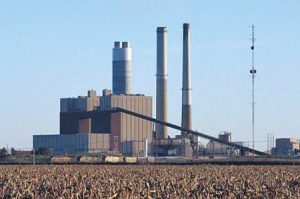Additional closures raise projected job losses to 545
By CARL GREEN
Illinois Correspondent

Baldwin, IL – The problem of transitioning from coal energy to cleaner sources isn’t getting any easier as Vistra Energy, one of the nation’s leading energy companies, keeps announcing plans to close its coal-burning plants in Illinois, threatening hundreds of union jobs.
In August 2019, Vistra announced it was planning to close four coal plants in central and northern Illinois, blaming the energy market and regulatory and environmental requirements. Job loss was estimated at about 300, including 159 from IBEW Local 51 in Springfield, IL.
In this area, there was some solace that two southern Illinois plants – Baldwin in nearby Randolph County and Joppa in Massac County at the state’s southern tip – were not on the closure list. But the other shoe dropped last week when Vistra said it would close both of those plants by 2025 and two others by 2027.
The company now plans to close all of its eight plants in Illinois. The first group of four were Coffeen, Duck Creek in Canton, Havana and Hennepin, scattered around central Illinois. The new announcements include Baldwin, with about 130 jobs, and Joppa by 2025, and the Kincaid and Newton plants in central Illinois, by 2027. The Kincaid closing would end 115 jobs.
Overall, the company since 2016 has announced plans to close 19 coal plants in Illinois, Texas, Ohio, Pennsylvania and Massachusetts.
GOING SOLAR
At the same time, Vistra said it plans to open six new solar plants and one energy storage facility, all in Texas. Its nuclear sites would remain open, too, in a project called “Vistra Zero.” Vistra is also developing the world’s largest battery energy storage project in California. Its goal is to become a zero carbon-power company.
“The aggregate impact of these milestone initiatives is clear: Vistra’s commitment to our transformation to a low-to-no-carbon future is unequivocal and offers unique opportunities for growth and innovation,” said Curt Morgan, president and CEO. “Vistra is paving the way for a sustainable future – economically and environmentally – and we’ve been focused on transitioning our generation portfolio for the benefit of the environment, our customers, our communities, our people and our shareholders.”
But it’s not so clear what becomes of the longtime workers at those plants left holding the bag as Vistra plunges into the future.
MITIGATING IMPACT ON WORKING FAMILIES, LOCAL ECONOMIES
The Kincaid Plant is in the jurisdiction of state Sen. Andy Manar (D-Bunker Hill), and he is proposing at least a temporary fix.
“For decades, the Kincaid plant has been a source of good-paying union jobs, paving a path to economic security for countless families,” he said. “My colleagues and I are working diligently on a plan that will mitigate damage done to working families and the local economies of the places these plants call home.”
Manar’s proposal would freeze property tax assessments on coal, gas and nuclear plants for five years at pre-closure rates to protect local schools and governments.
But it will take more, he said, to build local economies to where workers can find new jobs. “Ultimately, the state’s commitment to reinvesting resources in downstate communities rocked by plant closures has been woefully inadequate for far too long. This commitment needs to be taken seriously, and that means substantially increasing this reinvestment,” Manar said.
“It’s on all of us to continue supporting the good-paying union jobs that will be lost as a result of these closures. By transitioning the already existing plants into sustainable centers for clean energy production and storage, we can do just that, securing the economic stability of downstate Illinois going forward.”
CONVERTING CLOSED PLANTS
Meanwhile, the Sierra Club, no supporter of coal power, is all for turning the closed plants, including two more in Ohio, into clean energy providers.
“Supporting a fair and robust economic and community transition is a critical next step for Illinois and Ohio, and lawmakers in both states are in dialogue about the future of state energy policy,” said Mary Anne Hitt, Sierra’s national director of campaigns.
Jack Darin, director of the Sierra Club’s Illinois chapter, is promoting the Clean Energy Jobs Act (CEJA), a transition plan supported by the Illinois Clean Jobs Coalition.
“It’s urgent that Illinois plan now to assist the workers and communities that will be affected by these closures, ensure that Vistra cleans up these sites, and that we build clean, renewable energy infrastructure to replace these dirty sources of power,” Darin said. “We call on the Illinois Legislature to pass the CEJA this year to respond to these closures pro-actively and ensure a brighter future for our most impacted communities.”
In August last year when Vistra announced it would close four Illinois plants, company President Morgan indicated he was concerned about the effects on workers.
“By far, the hardest decisions we make in the business are those that significantly impact our people,” he said at the time. “As always, we will do right by those who are impacted by this announcement.”
COAL-TO-SOLAR
Morgan urged the Illinois Legislature to take up the proposed Coal to Solar and Energy Storage Act, which could help transform the plants into solar and battery energy storage facilities, using renewable energy credits funded by a charge per kilowatt-hour to be paid by the utilities. The bill was introduced last year but did not make it out of the Rules Committee for further consideration.
That may leave the issue in the hands of the state Legislature – whether the lawmakers want to go there or not.
Nikki Budzinski, executive director of Climate Jobs Illinois, said in a statement: “As Springfield debates new energy legislation, the final bill must include meaningful policies that support the workers, families and communities affected by Illinois’ transition to clean energy. That means providing workers’ lost wages and benefits, meaningful job support and apprenticeship opportunities and replacing the lost tax base in these communities.”


